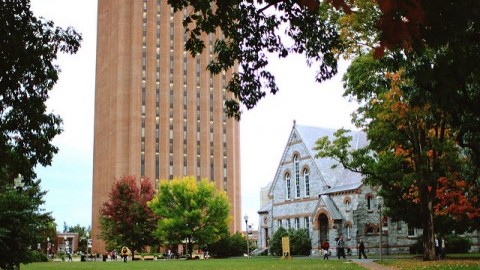On Wednesday, Ocean Vuong was named a 2019 MacArthur Fellow in the Fiction and Non-Fiction Writing category.
Vuong, a poet and novelist, currently serves as an assistant professor in the Masters of Fine Arts Program for Poets and Writers at the University of Massachusetts. His best-selling book, “On Earth We’re Briefly Gorgeous,” was recently long-listed for the 2019 National Book Award for Fiction, according to a press release from UMass News & Media Relations.
“You can push the form and the genre to the limit and see what happens. That is the ultimate gift,” Vuong told NEPR. “And that will change, hopefully for the better, the way I write and think.”
The MacArthur Fellowship awards a $625,000 unrestricted award to talented and creative individuals “as an investment in their potential,” according to the MacArthur Foundation website. Fellowships, often referred to as a “Genius Grant,” have been awarded since 1981.
The fellowships are awarded based on exceptional creativity, promise for important future advances based on a track record of significant accomplishments and potential for the Fellowship to facilitate subsequent creative work. Previous winners include playwright Lin-Manuel Miranda and biologist Paul Ehrlich. Typically, 20 to 30 Fellows are selected each year.
“Recipients may be writers, scientists, artists, social scientists, humanists, teachers, entrepreneurs or those in other fields, with or without institutional affiliations,” the Foundation states on their website. “They may use their fellowship to advance their expertise, engage in bold new work or, if they wish, to change fields or alter the direction of their careers.”
In his MacArthur Foundation biography, Ocean Vuong is celebrated for his work on the ongoing trauma of war and the conditions of exile. A child of illiterate rice farmers in rural Vietnam, Vuong came to the United States with his family as a two-year-old refugee.
His recent novel, “On Earth We’re Briefly Gorgeous” is structured as a letter from a son to his mother, who cannot speak English or read in any language.
“The loosely autobiographical novel is a tangle of personal and colonial histories,” the biography notes. “His poetry is infused with the rhythm, cadences and imagery of rural Vietnamese oral storytelling and folkloric traditions married to a restless experimentation with the English language.”
The biography adds, “Still early in his career, Vuong is a vital new literary voice demonstrating mastery of multiple poetic registers while addressing the effects of intergenerational trauma, the refugee experience and the complexities of identity and desire.”
Vuong is the fifth UMass faculty member to receive a MacArthur Fellowship. Previous recipients include Max Roach for Music Performance and Composition in 1988, Marc Shell for Literary History and Criticism in 1990, John Edgar Wideman for Fiction and Non-Fiction Writing in 1993 and Nancy Folbre for Economics in 1998. Three alumni with master’s degrees in regional planning have also received grants: Wesley Charles Jacobs, Jr. in 1987, Maria Varela in 1990 and Unita Blackwell in 1992.
The MacArthur Fellowship is one of many honors which Vuong has received in recent years. In 2018, the 30-year-old poet received the 2017 T.S. Eliot Prize for Poetry for his poetry collection “Night Sky with Exit Wounds.” The book, which was his debut, also won the Whiting Award, the Thom Gunn Award and the Forward Prize for Best First Collection.
“The UMass Amherst community is extraordinarily proud to have Ocean Vuong among us,” said UMass Chancellor Kumble Subbaswamy in the press release. “The MacArthur Fellowship celebrates his emerging status as a gifted writer who is a major voice of his generation and a creative force.”
Vuong is currently serving an artist-in-residence at the Asian/Pacific/American Institute at New York University, working at the Center for Refugee Poetics. Vuong’s writing has been featured in several publications, including The Atlantic, The New Yorker and American Poetry Review, which awarded him the Stanley Kunitz Prize for Younger Poets.
According to NEPR, when Vuong told his largely illiterate mother about the MacArthur award, she asked if it was a good thing, and Vuong assured her it was.
Kathrine Esten can be reached at [email protected] and followed on Twitter @KathrineEsten.




















